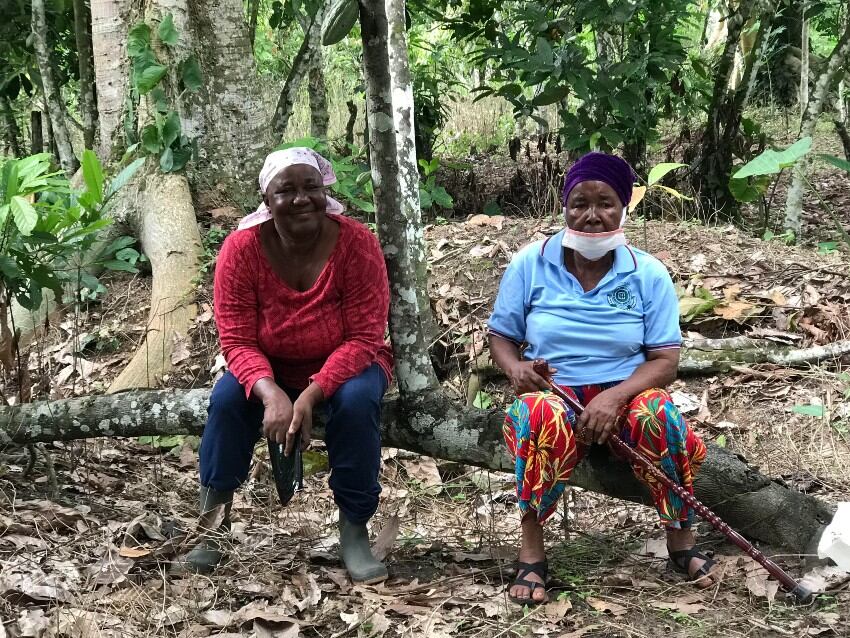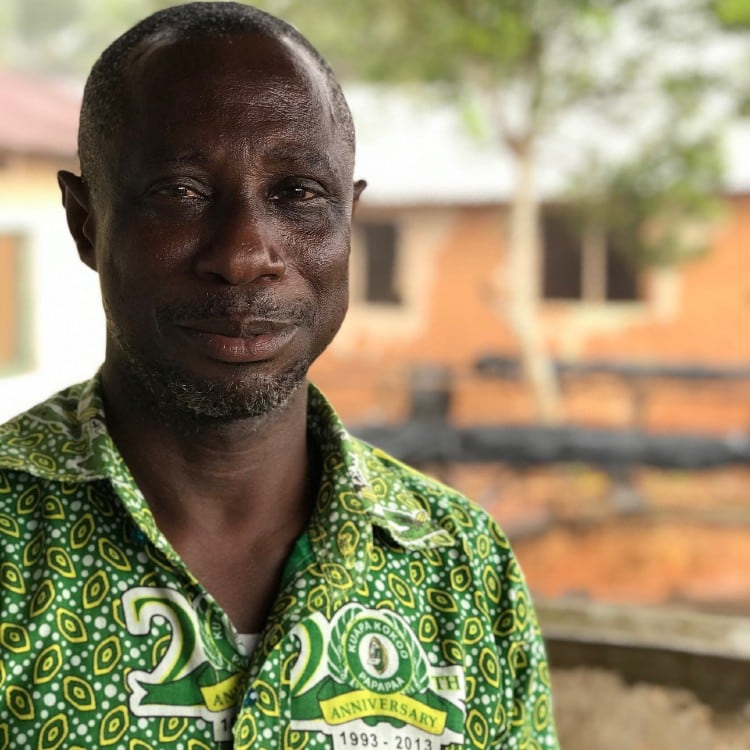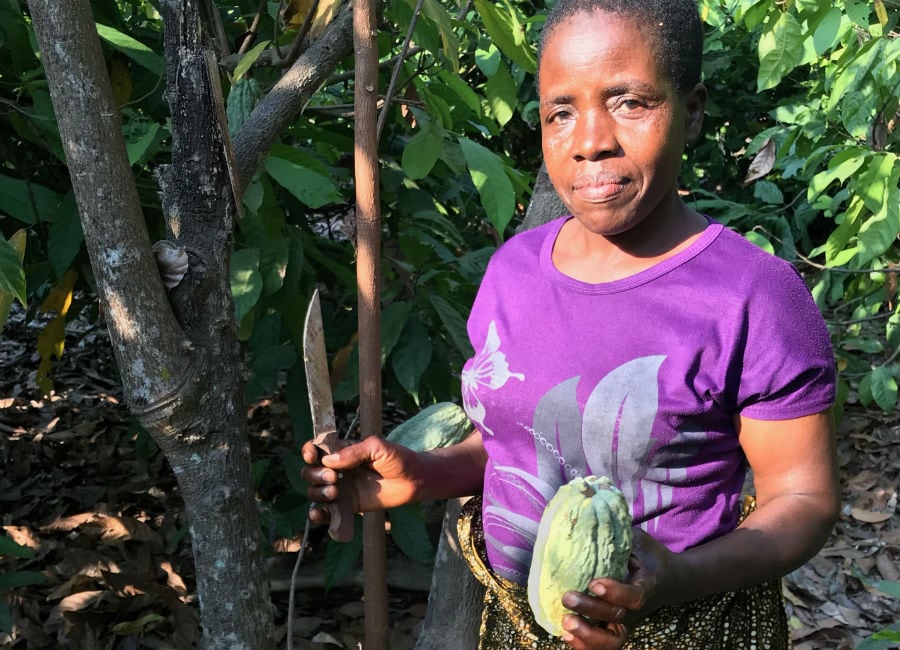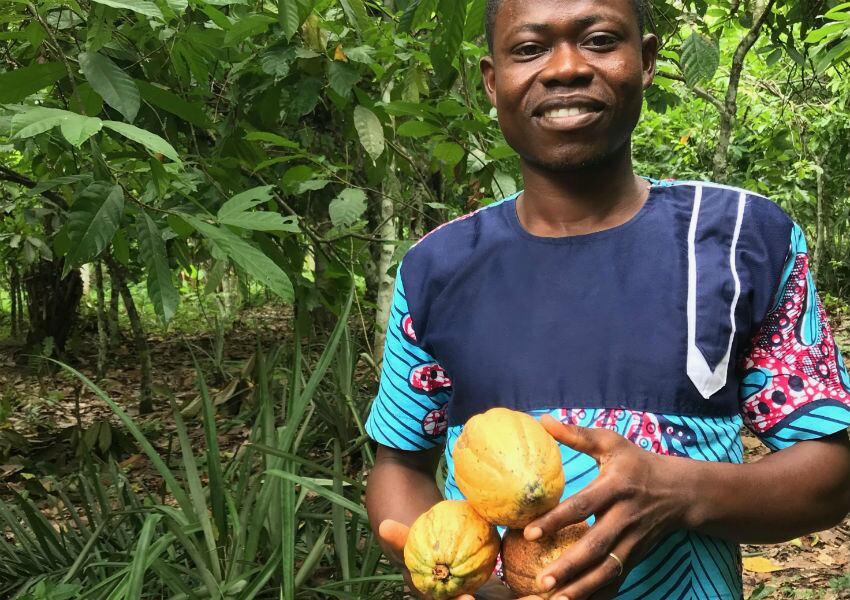Ama Ampomaa hadn’t been to her farm in three months. My research assistant, Benjamin Setor, helped her into my car, tucking her walking cane in beside her. We set out along the main road of Assin Fosu, in Ghana’s Central Region, to Ampomaa’s land.
Assin Fosu is a thriving town, home to several respected schools and the training centre for Ghana Immigration Service. We passed smart shops – electronics, hairstyling, a florist – and groups of energetic schoolchildren. But the road was in a dreadful condition.
When money comes from palm ... it goes only into the farmer’s [meaning the landowner’s] pocket. But when cocoa money comes, everyone gets a share! All farm hands get some. Everyone is happy. Even the atmosphere changes --- Ama Ampomaa
It’s shocking state gave Ampomaa an opportunity to explain local politics to me, which politician was doing (or not doing) what, to fix them. My hand bounced across the page of my notebook, making indecipherable scrawls. Our driver, Stanley Akposoe, passed a one-cedi note out the window, to the men who had taken it upon themselves to do road repair, hauling rocks to fill the gaping holes. Ampomaa was unfazed.
Yam Queen
Ampomaa had spent much of her adult life working in the market stalls that crowded the roadside, selling yams. I asked if she had been bayerehemaa – a yam queen. Even beneath her mask, I could tell she was smiling widely.
“Yes! Yes, I was bayerehemaa,” she said. “Not now, though. Now, I am weak. I traded yams for twenty years. I stopped eight years ago. Before then, I really liked it. But when my strength decreased, I had to stop.”
Trading yams is not easy. To make it profitable, Ampomaa explained, you need to buy a lot of yams. The trucks she hired could carry three thousand of the heavy tubers from the bush to market. If Ampomaa could not afford to buy three thousand and pay for transport, she collaborated with several other women. The work was successful, but taxing. Eventually, Ampomaa had to retire as bayerehemaa.
Always cocoa
Yams may have been the focus of Ampomaa’s career, but in the background was always cocoa. Our car left the main road and turned onto a bush track. Immediately the town bustle ceased. Waist-high grasses lined the track; beyond, mostly cocoa trees. We were on our way to a two-and-a-half-acre plot that once belonged to Ampomaa’s maternal grandfather. He had planted it not long after cocoa was first commercialised in Ghana, well over one hundred years ago. The parcel had passed down through Ampomaa’s mother to her and her siblings.
Ampomaa’s grandfather worked hard. “Really hard,” Ampomaa said, repeating the Twi word that indicates emphasis, or “very”: “pa pa pa pa pa.” He lived in a cottage on the plot, working the farm. When Ampomaa was little, she often walked there with her mother and father, a three-hour trek. The family would stay for a week, helping out, and enjoying being together.
Her grandfather acquired a second plot, where he also planted cocoa. Over the years, as the family grew, he built the house in town where Ampomaa now lives with her sister, Felicia Asare. The family prospered. Today, they control around one hundred plots of land around Assin Fosu.
To farm most of these, Ampomaa and her siblings enter into abunu contracts with long-term tenants. An abunu tenant is responsible for establishing a new farm on a plot. When the farm matures, the tenant earns the right to farm a designated portion and retain all the proceeds from it. Abunu tenancies benefit both parties: the landowner gets her or his land planted with a commercial crop; the tenant gets the right to farm. But, as with any labor contract between human beings, sometimes the arrangement can be fraught.
Just a week prior to my visit, Ampomaa had learned that one of her abunu tenants had cleared the land and planted oil palm, when she had specified cocoa. She told the tenant to take out the palm, and plant cocoa in its place.
Enter Emfed
After we had been driving along the bush track for about twenty minutes, Ampomaa told Akposoe to stop the car. We had reached the gateway to her grandfather’s first cocoa plot.
Ampomaa led the way down a narrow trail through the bush. We soon encountered a knee-deep stretch of water, the trail flooded from recent rain. By the time I had waded through, dried off, and put my boots back on, Ampomaa had shot ahead, cane in hand. She had not been to this land since before the start of Ghana’s light crop, which was coming to a close.
Ampomaa follows the productivity of all her family’s plots, but was especially interested to see what had been going on with this one. Unlike the others, which are mostly contracted to abunu tenants, this plot was under the management of Emfed Farms.
Founded by entrepreneur Kwabena Assan Mends, Emfed provides a service that is, as far as I know, unique in Ghana. Mends recognized that contracting with an abunu tenant, or, alternatively, with an abusa sharecropper, is not always straightforward. (Abusa is a seasonal arrangement in which the caretaker receives a portion of the proceeds, usually one third).
While the landowner is generally the more powerful party in either abunu and abusa, there are circumstances when this is not so. For an elderly person, a woman of any age, a widow, a person with a disability, or a landowner who lives far from their plot, it can be challenging to ensure that the tenant is working to specification, and sharing proceeds faithfully.
Of course, it also works the other way around. A powerful landowner may take advantage of a vulnerable tenant: for example, a migrant to the area, with no local connections to rely upon for support.
Mends established Emfed as a sharecropping service. It works much like abusa, whereby proceeds are divided into thirds, although Emfed sometimes splits proceeds half-half with clients. With Emfed, however, the landowner contracts with a company, not an individual. The power dynamics that may exist between, say, an elderly widow and a young male tenant, are reduced when working with Emfed.
Emfed employs a rotating team of workers (‘operators’) to do the farm labour. The business is only profitable if those operators do a good job across contracted plots. No one’s individual livelihood is invested in a single plot; the risk is spread over many.
Ampomaa was Emfed’s first client. She had entrusted care of this plot, a very special one to her family, for almost 10 years. That first season, Emfed’s operators harvested more cocoa than any year Ampomaa could remember: sixteen bags. At the 2012-13 producer price, sixteen bags earned GH¢3392 (US$1793 at the time), which was split between Emfed and Ampomaa.
The work of growing cocoa
Emfed may take a novel approach to sharecropping, but that doesn’t change the hard work of growing cocoa. While Ampomaa and Mends both visit the farm separately, they had not visited together since they entered into the contract in 2012.
Now, Ampomaa and her sister Asare examined the farm with critical eyes, and Ampomaa gave Mends instructions. Clear that area over there. Prune and spray those trees. Plant more plantain.
The harvest from the most recent main crop (last October-December, roughly) had been just six bags. (Ampomaa has a half-half arrangement with Emfed, so received the proceeds from three bags.) The owner of an adjacent plot had been preparing her land for new planting with controlled burning. However, the fire spread beyond the boundary, destroying part of Ampomaa’s plot. Ampomaa could have taken legal action, but the women were neighbours of longstanding, so Ampomaa assumed the loss herself.
Ampomaa was also replanting. Though new trees had been planted periodically since her grandfather’s time, most were beyond their commercial peak. Asare showed me a tree that had been planted when she was born, sixty-three years ago. Ampomaa had already asked Mends to replant one acre, and they discussed replanting the rest. The new seedlings, of course, are not yet producing cocoa, which also contributed to the reduction in harvest.
Once the whole plot has been replanted and the trees matured, by 2026, Mends expects to harvest 10 bags per acre, 25 in total. That would be a stellar harvest for Ampomaa. At cocoa’s current price, that would earn her GH¢16,500 (US$2785).
For now, Emfed’s progress with farm rehabilitation has satisfied Ampomaa. After our visit, she decided to give Mends management of another plot, where there is currently no crop.
“I know Mends,” she said. “I trust him. I might not know somebody else. I can’t trust a stranger.”
Cocoa family dynamics
I got the sense that Ampomaa, who is 74, had been the leader among her siblings. When she was growing up, she explained, sending girls to school wasn’t a priority. Her father chose to send her three brothers to study, but Ampomaa did not attend even primary school. Instead, she learned how to farm, at her mother’s side. Ultimately, she built a successful trading career, but formal schooling didn’t help her get there.
Ampomaa wanted something different for her sister Felicia Asare, who is 11 years her junior. Because she was already working when Asare was young, Ampomaa put her sister through school. Asare went on to a career as an administrator at University of Cape Coast. (As we walked on the farm, Setor, my research assistant and a graduate of UCC, discovered that Asare had worked in the same department where he had studied.)
Ampomaa also controlled decisions about cocoa income. The harvest on the Emfed-managed plot had recently been smaller than usual. But, over time, the sharecropping arrangement had given Ampomaa an almost effortless pot of money to draw upon. She has been strict about spending it.
Cocoa is our inheritance. I hope that, as time goes on, there is even more enlightenment for the young people, as far as cocoa is concerned. We hope that cocoa becomes a whole huge inheritance for their future --- Ama Ampomaa
Technically, the plots belong to all the siblings. Her brothers, Ampomaa told me, would prefer to have their individual shares paid out in cash after each harvest. She declines.
“I don’t give them a choice!” she said. “If you split the money into shares, and something happens in the family, how will we take care of it?” She gave me a recent example to illustrate.
“One of our aunts passed away. Her body is still in the morgue. [In Ghana, funerals are often delayed by weeks or months to allow time for arrangements to be made, and family to travel.] If I had split the money with [them], how would I get the cash to pay for her coffin?”
Cocoa money was only spent on items that benefited the whole family. When I had picked Ampomaa up at her house that morning, extensive renovations were underway. I could see the new house would be spacious and airy, a beautiful home for her family to enjoy. Cocoa had paid for it all.
Ghana’s inheritance
The price of cocoa, we all know, is too low, compared to the work it takes to grow it. Because of this, from the outside, it can seem as if growing cocoa is only oppressive to farmers. It may appear to exploit without exception, forcing everyone into a downward socioeconomic spiral.
In my experience, many people who farm cocoa in West Africa have a different perspective. Though they agree the price is too low, they simultaneously see cocoa as a source of wealth, an aspirational crop that can help generations to prosper.
Ampomaa expressed this view.
“When cocoa money comes into the country, things get better. Life gets easier. Everyone gets something small. When there is money in the system from cocoa, people are able to take care of themselves better.”
In this, cocoa was unlike other crops. Ampomaa had wanted her abunu tenant to replace the oil palm with cocoa, because cocoa elevated everyone. Palm did not.
“When money comes from palm,” she said, “it goes only into the farmer’s [meaning the landowner’s] pocket. But when cocoa money comes, everyone gets a share! All farm hands get some. Everyone is happy. Even the atmosphere changes.”
I asked what she meant. Ampomaa explained that cocoa money was substantial enough to give people options. It was enough to pay for all sorts of things.
“Some use it to take care of their children, some to do a small business, to take care of their family. Some use it to build.”
Ampomaa’s daughter had taken care of her own five children, thanks to cocoa. For Ampomaa, who had not had the opportunity to go to school, I could hear her pride when she told me about her grandchildren’s accomplishments. One is finishing secondary school. Two are studying at UCC — one in nursing, the other in education. Another has graduated and works at a psychiatric hospital.
I asked what she would like readers to know, especially people who are not familiar with cocoa in Ghana.
“Know that there is a lot of profit, a lot of benefit coming from cocoa. Food, cloth, giving a child money for school – anything you need to take care of the family.”
People hadn’t always treated cocoa farmers with respect, Ampomaa told me. During Kwame Nkrumah’s time, she said there had been a lot of cheating of farmers. But today, cocoa farmers were getting support, and respect.
“Cocoa is our inheritance. I hope that, as time goes on, there is even more enlightenment for the young people, as far as cocoa is concerned. We hope that cocoa becomes a whole huge inheritance for their future.”
- Author’s note: Conversions from Ghana cedis to US dollars were current as of 14 July 2020, unless otherwise noted. During our interview, I asked questions in English and Ama Ampomaa replied in Twi. My thanks to Benjamin Setor Gbadago for translating.
About 'Dr Chocolate'
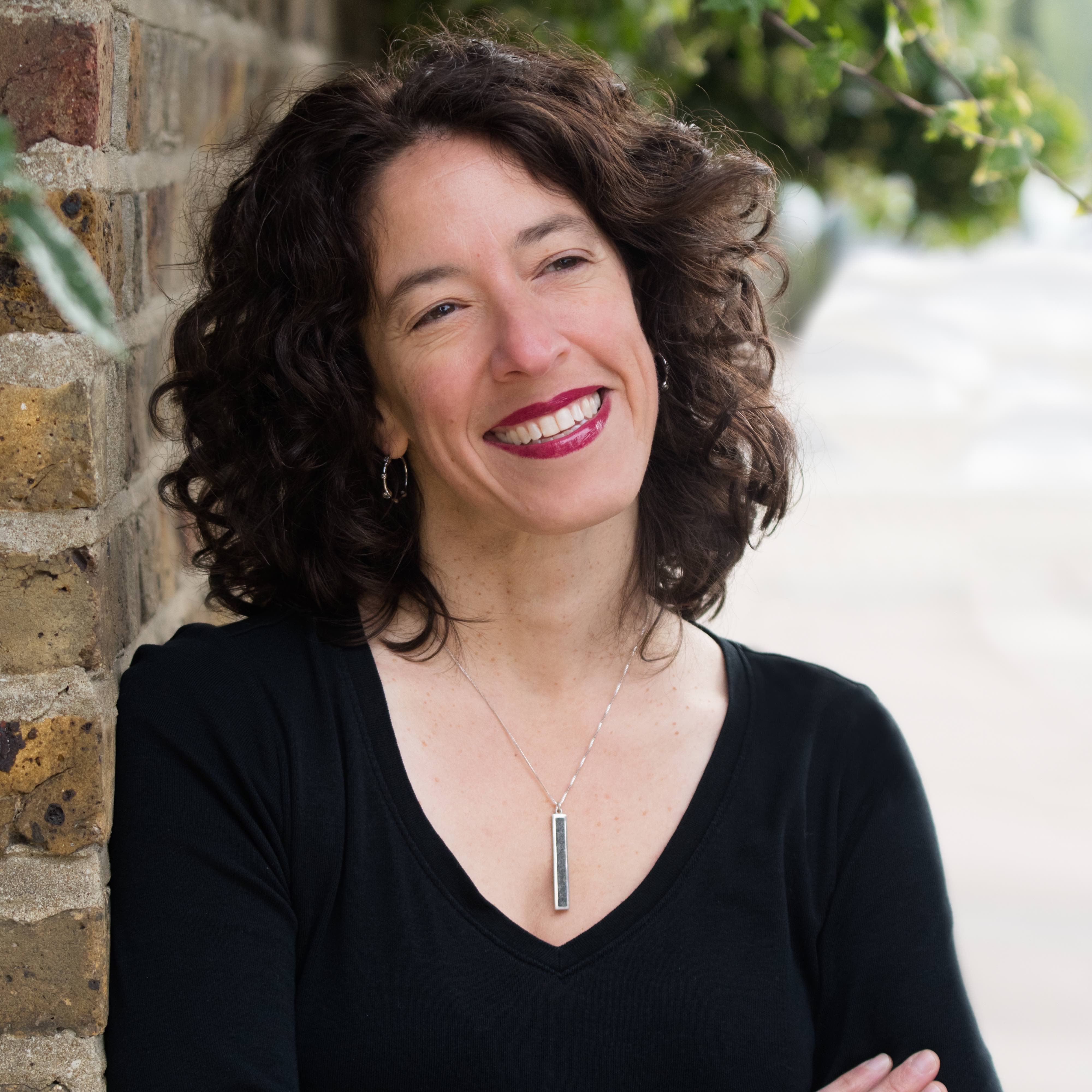
Dr Kristy Leissle is a scholar of cocoa and chocolate, and a member of CN's editorial board. Since 2004, her work has investigated the politics, economics, and cultures of these industries, focusing on West African political economy and trade, the US craft market, and the complex meanings produced and consumed through chocolate marketing and advertising. Her recent book, Cocoa (Cambridge: Polity, 2018) explores cocoa geopolitics and personal politics, and was #3 on Food Tank’s 2018 Fall Reading List.

